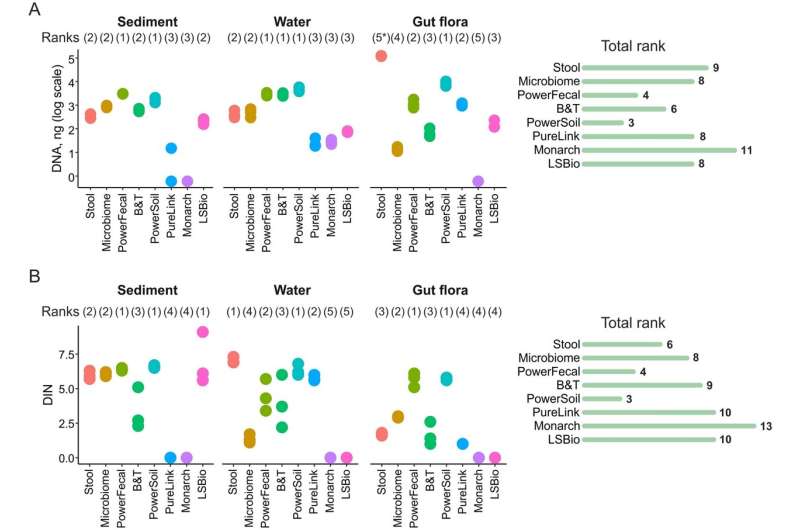This article has been reviewed according to Science X's editorial process and policies. Editors have highlighted the following attributes while ensuring the content's credibility:
fact-checked
peer-reviewed publication
trusted source
proofread
New research reveals how to obtain high-quality DNA from marine samples

The oceans are still the most underexplored part of our planet. Diversity of large organisms in the Arctic Ocean has been investigated in many ways, yet research on the diversity of Arctic microorganisms is lacking. One of the problems, apart from inaccessibility, is obtaining high-quality microbial DNA: when working with natural samples, DNA often degrades—it is obtained in low quantities and can contain inhibitors that interfere with sequencing.
Today there are many methods for isolating microbial DNA, but they are not directly optimized for marine samples. The absence of an understandable, proven methodology for this task slows down the study of marine microorganisms. But it is these studies that foster the search for new genes responsible for the synthesis of antibiotics or genetic editor enzymes.
A research team from Skoltech, Moscow State University, and other leading scientific organizations, led by the head of the Laboratory of Metagenome Analysis Artem Isaev, identified the most effective kits for DNA isolation from different types of marine samples and presented the results in a new paper published in Scientific Reports.
The waters of the northern seas of Russia have remained unexplored for a long time. "This is a hard-to-reach area, but very diverse, so we focused specifically on the Pacific and Arctic Oceans. Together with the Marine Research Center of Moscow State University, we organized expeditions and collected three types of samples: sea water and sediments, as well as samples of invertebrates," said the leading author of the work Alina Demkina, a senior technician at Skoltech's Laboratory of Metagenome Analysis.
According to the researchers, although metagenomic research is actively developing, there are still no common criteria or standards for working with marine samples. "Natural samples are very specific. Our goal was to isolate high-quality DNA, allowing long-reads sequencing. It turned out that there is no standard technique suitable for each type of marine sample.
"Creating it from scratch is a very long, expensive, and time-consuming task, so we focused on ready-made commercial kits and checked which of them could produce the best-quality result for different types of marine samples," shared Darya Slonova, a co-author and a junior research scientist at Skoltech's Laboratory of Metagenome Analysis.
The researchers tested eight DNA isolation kits. For each combination of the kit and sample, they measured the amount of purified DNA, the degree of its fragmentation, the presence of PCR-inhibiting pollutants, the admixture of eukaryotic DNA, alpha diversity, and reproducibility of the resulting community composition based on 16S rRNA amplicon sequencing.
Scientists have also identified the kitomes—a composition of microbial taxa that may be present in the reagents used to isolate DNA. This is especially important, since the waters of the northern seas are quite poor in microbes, and therefore even a small admixture of contaminating DNA can affect the analysis.
"The article gives recommendations to scientists on which methods are best suited for isolation of high-quality DNA from marine samples," continued Alina Demkina. "Researchers will learn which kits are suitable for each specific type of sample, depending on the goals of their work," Darya Slonova supported.
More information: Alina Demkina et al, Benchmarking DNA isolation methods for marine metagenomics, Scientific Reports (2023). DOI: 10.1038/s41598-023-48804-z
Journal information: Scientific Reports
Provided by Skolkovo Institute of Science and Technology




















